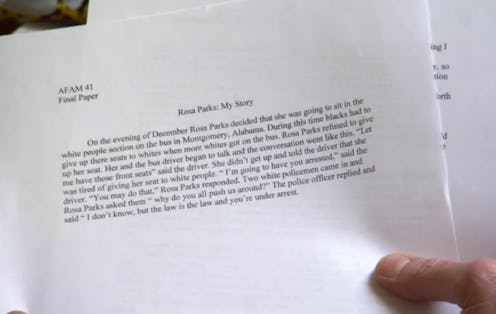Life
Does This 146-Word Essay Deserve An A-?

If I had ever turned in a 146-word final paper to one of my professors, I can assure you I would not have received an A- even if they were the most brilliant 146 words written in English. But apparently if you're an athlete at the University of North Carolina, those 146 words don't even have to be grammatically correct. Former professor Mary Willingham provided the essay as an example of the sort of "work" that UNC athletes are allowed to get by on at the school, and the image has certainly sparked conversation around the topic.
It's one thing to know that athletes that attend schools where sports are a priority get special treatment and are often given grades they don't deserve just to keep them on the team. But it's a whole 'nother thing to see a one paragraph essay that makes up a fictional conversation between Rosa Parks and a bus driver and know that the jock who wrote it got a better grade than lots of kids get for their well-researched 10-page essays. But according to Willingham, who spent 10 years tutoring student athletes before turning whistleblower, this sort of thing happens all the time.
"I became aware of this 'paper class' system," she told ESPN, "where students would take classes that didn't really exist." Formerly called "independent studies," these "paper classes" involve no attendance, and in fact only require students to write a paper, at least according to Willingham. And the papers the students produce are far from college quality; in fact, Willingham says, some of the players only have a second grade reading level, which for an adult is functionally illiterate.
The paper she provided as an example reads as follows:
On the evening of December Rosa Parks decided that she was going to sit in the white people section on the bus in Montgomery, Alabama. During this time blacks had to give up there seats to whites when more whites got on the bus. Rosa Parks refused to give up her seat. Her and the bus driver began to talk and the conversation went like this. “Let me have those front seats” said the driver. She didn’t get up and told the driver that she was tired of giving her seat to white people. “I’m going to have you arrested,” said the driver. “You may do that,” Rosa Parks responded. Two white policemen came in and Rosa Parks asked them “why do you all push us around?” The police officer replied and said “I don’t know, but the law is the law and you’re under arrest.
In the ESPN segment, Willingham's allegations are backed up by former UNC athlete Duenta Williams, who added that advisors at the school were mostly interested in ensuring that he remained eligible to play, not in ensuring he got the best education possible. They both also claim that the NCAA turned a blind eye to these practices.
Though obviously this sort of preferential treatment screams of unfairness, the people it will ultimately end up hurting most are the athletes themselves. For student athletes, sports prowess should be a gateway to an education. Instead, if Willingham's allegations are true, schools are prioritizing their own reputation as a sports powerhouse over their students' education, viewing classes and grades not as the true purpose of a student's time in school but as pesky requirements to be cheated.
Image: ESPN